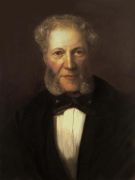
Ignaz Moscheles
(1794-1870)

 |
Ignaz Moscheles |
 |
Strange as it may seem today, Isaak-Ignaz Moscheles was once very well-known in the musical figure of Central Europe (with strong connections to England) during the first part of the 19th century. His piano music was very fashionable until the rise of Chopin and Liszt in the 1830s gradually made his style look old-fashioned. Born in Prague ('Mother Israel') in 1794 to Jewish parents, young Isaak was already playing Beethoven's 'Pathetique' Sonata by the age of seven; indeed Beethoven was to become an important figure in his early life having being commissioned to prepare the piano vocal score of 'Fidelio' in 1814. He also studied with Antonio Salieri, who pleaded with him on his deathbed to remove the stain of the lie that he has poisoned Mozart. By 1814 Moscheles' pianistic career reached a high point when his 'Alexander Variations' created a sensation at the Congress of Vienna. He lived in England during the 1820s and was a central figure in the Royal Philharmonic Society – enabling a payment of £100 to the ailing Beethoven in 1826 and conducting the premieres of the 'Missa Solemnis' in 1832. His marriage to Hamburg-born Charlotte (Embden) in 1825 produced several children, including the artist Felix Moscheles. Charlotte also published her late husband's diary - an important document of 19th century musical history containing Moscheles' personal recollections of Salieri, Beethoven, Mendelssohn and so many others.
In 1824 Moscheles was asked by Abraham and Lea Mendelssohn to teach their two eldest children Fanny and Felix. It soon became obvious that both children were way beyond the ordinary and the teacher-pupil relationship with Felix in particular matured into a deeply mutual friendship, with the result that Felix invited Moscheles to be the first Head of Keyboard at the new Leipzig Conservatoire in 1846, a position he retained until his death in 1870. (A young Arthur Sullivan was one of his last pupils as the first Mendelssohn Scholar). Moscheles composed eight piano concertos and some important sets of piano studies in addition to numerous character pieces, much of which started going out of fashion even during his lifetime; he has however enjoyed something of a revival since the centenary in 1970, when his descendents Jerome and Henry Roche contributed special features for 'Musical Times' and BBC Radio 3 respectively.
Moscheles contributed Variation 26 to the 50 by contemporaries of Anton Diabelli's famous (if somewhat trite) theme entitled: 'Vaterlandisches Kunstlerverein – Veranderungen'.